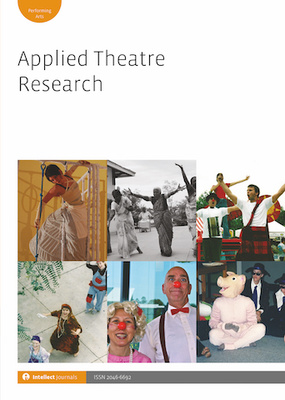
Applied Theatre Research 6.2 is now available
Intellect is pleased to announce that Applied Theatre Research 6.2 is now available! For more information about the issue, click here >> https://bit.ly/2BEeIGT
Contents
Editorial
Authors: John O’Toole And Peter O’Connor
Page Start: 85
Reimagining ‘role’ and ‘character’: An approach to acting training for role-play simulation in the tertiary education setting
Authors: Gillian Arrighi And Clare Irvine And Brian Joyce And Kirsti Haracz
Page Start: 89
The efficacy of role-play simulation (RPS) education rests on its ability to comprehensively reflect real-life situations. The goal is to create immersive events or situations that enable a student to spontaneously respond in a controlled environment that nevertheless reflects their anticipated work experience. While an extensive body of literature exists that reports on the aims, working methods and outcomes of RPS across empirically based disciplines such as medicine and health, law, business, social work, engineering, management, and education, very little research has been published on appropriate or possible training models for the ‘actors’ in RPS. Reporting on a multi-part, interdisciplinary action research project based at the University of Newcastle, Australia, across the subject areas of drama and pharmacy (2012), and later occupational therapy (2013–18), this article examines an actor-training method that reimagines approaches to developing ‘role’ and ‘character’ in RPS and evaluates the outcomes for student learning.
What does the actor need to perform in health care? Emotional demands, skills and competencies
Authors: Persephone Sextou And Anatoli Karypidou
Page Start: 107
This article aims to explore the required skills and competencies of the actor who works in health-care systems. A narrative inquiry gave the opportunity for participants to elaborate on their understandings of their direct or indirect engagement with theatre in hospitals. Data were collected in the form of ten narrative interviews with experienced actors in hospitals and drama trainees. Inductive thematic analysis of this collection of qualitative data was used to allow findings to emerge from frequent or significant themes inherent in the semi-structured interviews. The study demonstrates a defensible emphasis on key themes, including the predictable professional skills such as acting in participatory dramas, using theatre improvisation and puppetry, and interpersonal skills such as emotional intelligence and empathetic awareness.
Fugitive knowledge: Performance pedagogies, legibility and the undercommons
Authors: Aylwyn Walsh
Page Start: 121
In Held, the criminal justice project I conducted at the University of Leeds with second-year theatre and performance students, performance pedagogies were structured to produce an ethnodrama. As part of the course, I developed partnerships with community-based partners Leeds Magistrates, Her Majesty’s Prison and Probation Service, and Ripon House. Students presented the performed ethnodrama to partners and invited guests. In this article, I examine how such performance-making enables students to interrogate their own understandings about the criminal justice system. In particular, they were asked to think about precarity and criminalization, and how institutions rely on authoritative readings of ex-prisoners’ records. I reflect on how higher education institutions produce knowledge. Throughout, I offer critical framing influenced by Stefano Harney and Fred Moten’s The Undercommons.
The responsible citizen: An investigation of the Theatre of the Oppressed
Authors: Anna S. Songe-Møller And Karin Brunvathne Bjerkestrand And Gunhild Brænne Bjørnstad
Shared experiencing, shared understandings: Intersubjectivity as a key phenomenon in drama education
Authors: Tuija Leena Viirret
Page Start: 155
This article is a philosophical reflection on intersubjectivity in the context of drama education; it draws on the concept’s most recent neuroscientific basis as well as the perspectives of Merleau-Ponty, Buber and Husserl. Its purpose is to deepen our understanding of the mechanisms of interaction in learning processes in drama education. In the stream of interaction in drama, the central conditions are shared experiencing and shared understandings. Intersubjectivity encompasses both of these. This study views intersubjectivity as an innate capacity and a real phenomenon – one that is a key phenomenon in the interactions of drama education.
Process drama and co-creation: Democratic participation in museum education
Authors: Odette Tetlie
Page Start: 167
Norwegian museums play a role as institutions of democratization, their goal being – among other things – the implementation of dialogue-based and participatory education programmes. This article is based on the process drama Gundell Olsdatter, developed in 2014–15 at Steilneset Memorial in Vardø, associated with Varanger Museum, in the very north of Norway. The project focuses on the pupils’ opportunities for participation and involvement in the process drama, in conjunction with philosopher Carl Cohen’s three dimensions of democracy: breadth, depth and width. In this article, I analyse and discuss how process drama as a framework may facilitate co-creation within museum education, thus helping to make the education more democratic and participatory. The findings show that certain dramatic conventions provide a deeper degree of participation by providing the students with practice in involvement and decision-making. Through the dramatic process, the pupils become not only spectators, but also contributors to the knowledge and mediation process.

